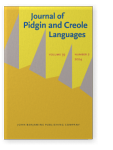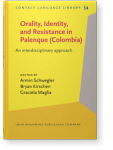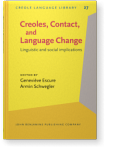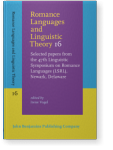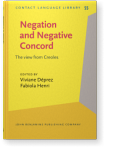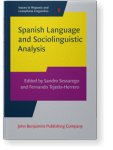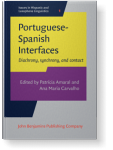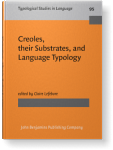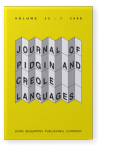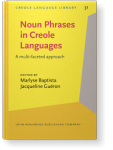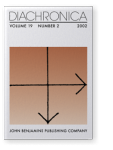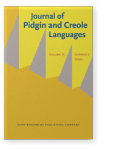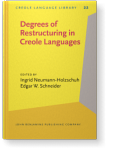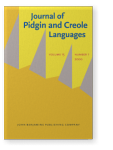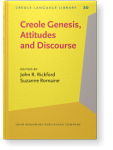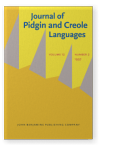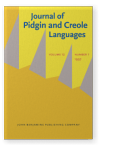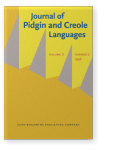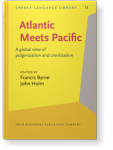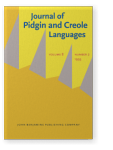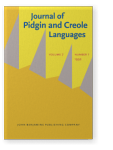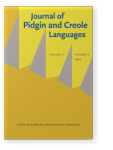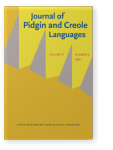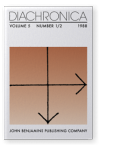Armin Schwegler
List of John Benjamins publications for which Armin Schwegler plays a role.
Journal
Book series
Titles
Orality, Identity, and Resistance in Palenque (Colombia): An interdisciplinary approach
Edited by Armin Schwegler, Bryan Kirschen and Graciela Maglia
[Contact Language Library, 54] 2017. xvii, 323 pp.
Subjects Contact Linguistics | Creole studies
Creoles, Contact, and Language Change: Linguistic and social implications
Edited by Geneviève Escure and Armin Schwegler
[Creole Language Library, 27] 2004. x, 355 pp.
Subjects Contact Linguistics | Creole studies | Historical linguistics | Sociolinguistics and Dialectology
Romance Linguistics: Theoretical Perspectives. Selected papers from the 27th Linguistic Symposium on Romance Languages (LSRL XXVII), Irvine, 20–22 February, 1997
Edited by Armin Schwegler, Bernard Tranel and Myriam Uribe-Etxebarria
[Current Issues in Linguistic Theory, 160] 1998. vi, 349 pp. + index
Subjects Generative linguistics | Phonology | Romance linguistics
2020 Palenque (Colombia): African language survivals and their identification Romance Languages and Linguistic Theory 16: Selected papers from the 47th Linguistic Symposium on Romance Languages (LSRL), Newark, Delaware, Vogel, Irene (ed.), pp. 241–258 | Chapter
This article examines the revitalization of African language survivals in the former maroon community of Palenque, Colombia. During much of the 20th century, lexical Africanisms in everyday Palenquero creole were scant. Ritual language (Lumbalú) and the speech of a few elderly Palenqueros still… read more
2018 Negation in Palenquero: Syntax, pragmatics, and change in progress Negation and Negative Concord: The view from Creoles, Déprez, Viviane and Fabiola Henri (eds.), pp. 257–288 | Chapter
This study offers an up-to-date (synchronic) overview of Palenquero predicate negation, and seeks to explain how and why it has recently begun to undergo change, especially among the younger generations. Earlier descriptions (e.g., Dieck 2000, 2002, Schwegler 1991a, 1996a) revealed that Palenquero… read more
2017 Chapter 2. On the African origin(s) of Palenquero Orality, Identity, and Resistance in Palenque (Colombia): An interdisciplinary approach, Schwegler, Armin, Bryan Kirschen and Graciela Maglia (eds.), pp. 51–119 | Chapter
This article examines African influences on Palenquero, a creole language spoken in El Palenque de San Basilio (Colombia). The introduction offers an explanation as to why investigations into the (African) origins of Palenque and its creole have presented special challenges. The study then turns to… read more
2016 Combining population genetics (DNA) with historical linguistics: On the African origins of Latin America’s black and mulatto populations Spanish Language and Sociolinguistic Analysis, Sessarego, Sandro and Fernando Tejedo-Herrero (eds.), pp. 33–88 | Article
The purpose of this chapter is to explore the African provenience of some of Latin America’s Black inhabitants and to demonstrate how recent advances in research have made it possible to determine their ancestors’ origin with a high degree of specificity. To that end, the ancestry of two specific… read more
2014 Portuguese remnants in the Afro-Hispanic diaspora Portuguese-Spanish Interfaces: Diachrony, synchrony, and contact, Amaral, Patrícia and Ana Maria Carvalho (eds.), pp. 403–441 | Article
During the transatlantic slave trade, several pidgin Portuguese contact varieties originally spoken in sub-Saharan Africa came into contact with New World Spanish. In the Americas, the resulting Afro-Iberian diaspora involved thousands of speakers, and was far-flung, extending from Cuba to Bolivia… read more
2011 Palenque(ro): The search for its African substrate Creoles, their Substrates, and Language Typology, Lefebvre, Claire (ed.), pp. 225–249 | Article
This article examines substratal influences in Palenquero (Colombia). It begins with an explanation of why research on the origins of Palenque and its language has been particularly challenging, and what these challenges mean in terms of how convincing the reigning hypothesis of a sole Kikongo… read more
2008 Intonation in Palenquero Journal of Pidgin and Creole Languages 23:1, pp. 1–31 | Article
The least understood aspect of Palenquero phonology is its intonational system. This is a serious gap, as it is precisely in the realm of prosody that the most striking phonological differences between Palenquero and (Caribbean) Spanish are apparent. Although several authors have speculated that… read more
2007 7. Bare nouns in Palenquero: A fresh consensus in the making Noun Phrases in Creole Languages: A multi-faceted approach, Baptista, Marlyse and Jacqueline Guéron (eds.), pp. 205–222 | Chapter
The present article argues that the traditional accounts of Palenquero's article system are fundamentally flawed. Schwegler's revisionist analysis is largely based on data he had collected in situ, but also relies on Moñino (in press), who similarly questions the traditional accounts of the… read more
2002 On the (African) origins of Palenquero subject pronouns Diachronica 19:2, pp. 273–332 | Article
Summary A principal aim of this paper is to show that (1) the Palenquero (Colombia) pronominal system in toto needs to be revised in the direction of greater Africanicity, and (2) speakers of Kikongo must have played a dominant role in the formation of Palenquero. This study offers evidence for… read more
2000 The African Vocabulary of Palenque (Colombia) Journal of Pidgin and Creole Languages 15:2, pp. 241–312 | Article
2000 The myth of decreolization: The anomalous case of Palenquero Degrees of Restructuring in Creole Languages, Neumann-Holzschuh, Ingrid and Edgar W. Schneider (eds.), pp. 409–436 | Article
2000 On the (sensational) survival of Kikongo in 20th-century Cuba Journal of Pidgin and Creole Languages 15:1, pp. 159–164 | Miscellaneous
1999 Monogenesis Revisited: The Spanish Perspective Creole Genesis, Attitudes and Discourse: Studies celebrating Charlene J. Sato, Rickford, John R. and Suzanne Romaine (eds.), pp. 235–264 | Article
1997 Creolistics and the Study of Latin American Spanish Journal of Pidgin and Creole Languages 12:2, pp. 319–331 | Article
1997 Review of Bartens (1995): Die iberoromanisch-basierten Kreolsprachen Journal of Pidgin and Creole Languages 12:1, pp. 159–169 | Review
1993 Subject Pronouns and Person/ Number in Palenquero Atlantic Meets Pacific: A global view of pidginization and creolization, Byrne, Francis and John Holm † (eds.), pp. 145–164 | Article
1992 Review of Singler (1990): Pidgin and creole tense-mood-aspect systems Journal of Pidgin and Creole Languages 7:1, pp. 119–134 | Review
1992 Future and Conditional in Palenquero Journal of Pidgin and Creole Languages 7:2, pp. 223–259 | Article
Previous research (including the recent monographs of Friedemann & Patino Rosselli 1983 and Megenney 1986) states that Palenquero (henceforth PAL) has but a single future particle — tan — and lacks overt irrealis markers to express conditionals. This paper takes issue with earlier claims by showing… read more
1991 Negation in Palenquero: Synchrony Journal of Pidgin and Creole Languages 6:2, pp. 165–214 | Article
A conspicuous feature of Palenquero (P) morphosyntax is the unusual, though by no means unique, often clause-final or sentence-final placement of the predicate negator nu 'not', e.g., i [NU] kelé bae aya NU 'I don't want to go there'. Previous descriptions, often cited in the literature, present… read more
1988 Word-Order Changes in Predicate Negation Strategies in Romance Languages Diachronica 5:1/2, pp. 21–58 | Article
SUMMARY Through the detailed investigation of changes in predicate negation patterns of numerous, often poorly documented informal spoken varieties of Romance vernaculars (including Romance-derived creoles), this paper explores the view that despite considerable formal differences, languages tend… read more
